So far as accusations against Lady Purbeck of witchcraft were concerned, Buckingham must have found that he had no case; for, in a letter[77] to Carleton, written on 12th March, 1625, Chamberlain says that the charge of sorcery had been dropped; but that Lady Purbeck was to be prosecuted for incontinency. He adds that Sir Robert Howard was a close prisoner in the Fleet in spite of the advice given by the Attorney-General and the Solicitor-General three weeks earlier—and that Lady Purbeck was a prisoner at Alderman Barkham’s, had no friends who would stand bail for her, and was asking Buckingham to let her have a little money with which to pay her counsel’s fees. Eleven days later Chamberlain again wrote[78] to Carleton, saying that Lady Purbeck was acquitting herself well in the Court of High Commission; that a servant of the Archbishop’s had been committed for saying that she had been hardly used, and that she called this man one of her martyrs. He also states that Sir Robert Howard had been publicly excommunicated at St. Paul’s Cross, for refusing to answer.
How long the delinquents were kept in captivity is very doubtful. Little else is recorded of either of them during the next two years; but, at the time of their trial in 1627, they would seem to have been at liberty. The reason of this long interval between the trial in the Court of High Commission in 1625 and that before the same Court in 1627 seems inexplicable.
FOOTNOTES:
[61] Cabala, p. 281.
[62] Cabala, p. 282.
[63] S.P. Dom., James I., Vol. CLXXXII, No. 79.
[64] S.P. Dom., James I., Vol. CLXXXIII, No. 41
[65] Innocent Lanier was one of the King’s musicians.
[66] MSS. of the House of Lords, 228, 30th April, 1675. Hist. Com. MSS., Ninth Report, Part II., p. 50.
[67] S.P. Dom., James I., Vol. CLXXXIII, No. 52.
[68] S.P. Dom., James I., Vol. CLXXXIII, No. 65, 16th February, 1625.
[69] Ibid., No. 66.
[70] S.P. Dom., James I., Vol. CLXXXIV., Nos. 7 and 7.1.
[71] S.P. Dom., James I., Vol. CLXXXIII, No. 65.
[72] Camden, Complete History of England, Vol. II., p. 791 (ed. 1719).
[73] Memorials of the English Affairs, etc., p. 17.
[74] S.P. Dom., James I., Vol. CLXXXIV., No. 47.
[75] S.P. Dom., Charles I., Vol. XXVI., No. 30.
[76] This looks like an anticipation of Mesmer.
[77] S.P. Dom., James I., Vol. CLXXXV., No. 48.
[78] S.P. Dom., James I., No. 99.
CHAPTER X.
“Let us give great Praise to God, and little Laud to the Devil.”
(Grace said by the Court Jester, Archie Armstrong, when he had begged to act as chaplain, in the absence of that official, at the dinner-table of Charles I. Archbishop Laud was little in stature.)
The following account of the trial of Lady Purbeck in 1627 is given by Archbishop Laud:—[79]




